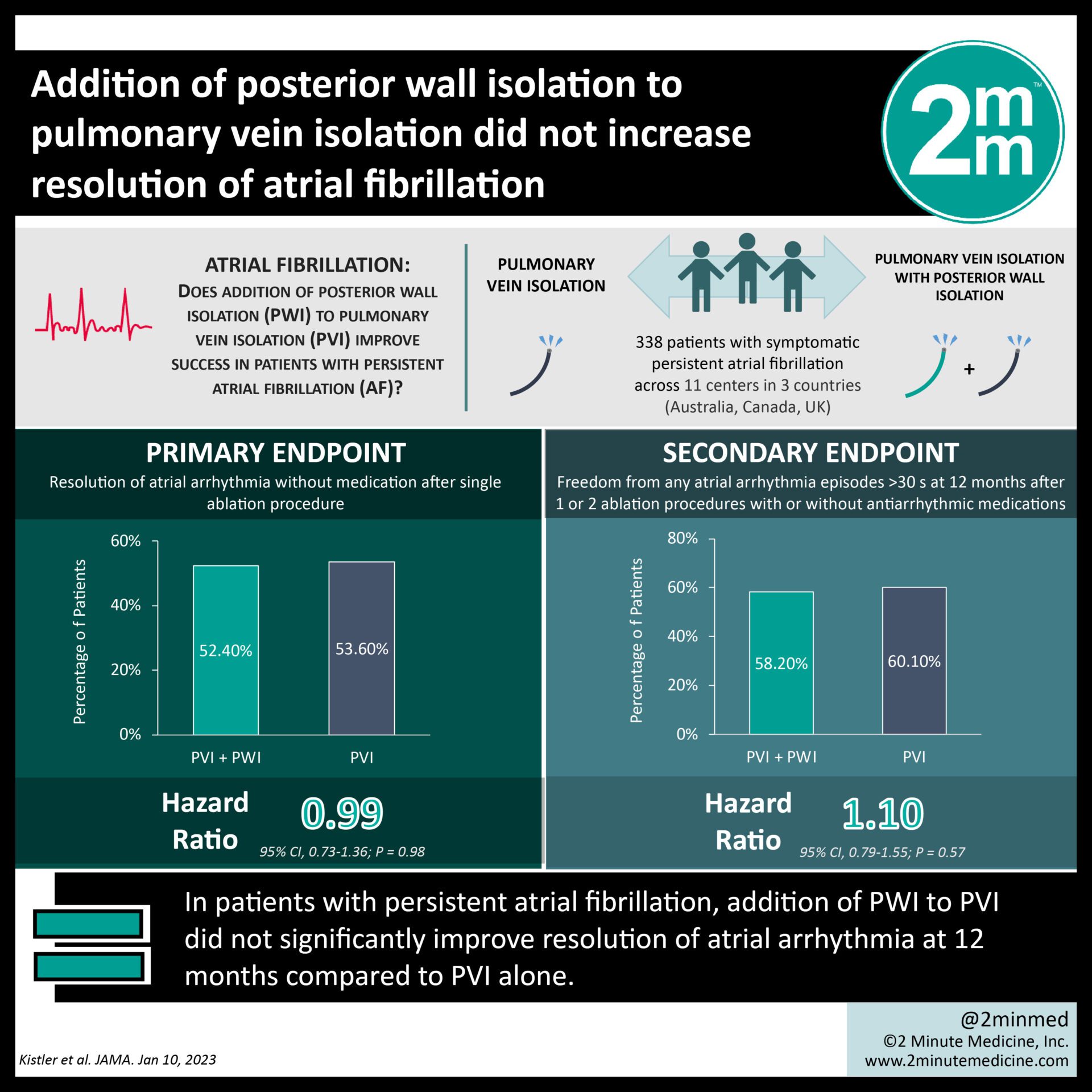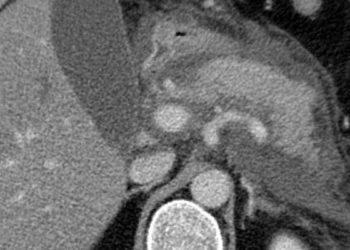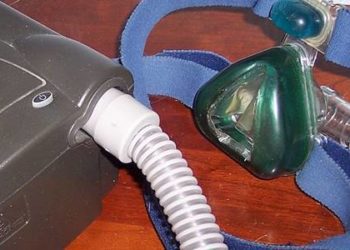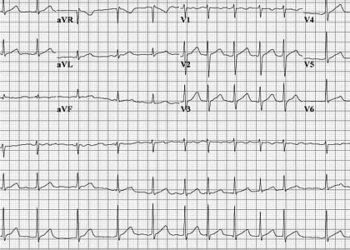#VisualAbstract: Addition of posterior wall isolation to pulmonary vein isolation did not increase resolution of atrial fibrillation
 1. Among patients with persistent atrial fibrillation (AF) treated with cardiac ablation, those who underwent pulmonary vein (PVI) and posterior wall isolation (PWI) had no significant difference in outcomes compared to those who underwent PVI alone.
1. Among patients with persistent atrial fibrillation (AF) treated with cardiac ablation, those who underwent pulmonary vein (PVI) and posterior wall isolation (PWI) had no significant difference in outcomes compared to those who underwent PVI alone.
2. The mean procedure time was significantly shorter for those undergoing PVI alone compared to PVI and PWI in combination.
Level of Evidence Rating: 1 (Excellent)
Study Rundown: Atrial fibrillation is a common arrhythmia which can have dangerous complications, including thrombotic events such as stroke. Various pharmacologic options for rate and rhythm control exist in addition to antiarrhythmic procedures including cardiac ablation. The most common technique in cardiac ablation for AF is PVI, with estimates of successful AF control after a single procedure varying from 43-67%. Recently, PWI has emerged as an alternate or additive ablation technique, as the posterior wall contains the septopulmonary bundle, which has also been implicated in Afib development. The present study sought to determine whether there was added benefit to PWI ablation in addition to PVI regarding reduced AF recurrence.
In total, 338 patients were included in this trial, and 330 (97.9%) completed the study up to 12-month follow-up. 206 patients were in non-sinus rhythm at the time of ablation, including 63.5% of the PVI group and 58.3% of the PVI/PWI group. At 12 months, 52.4% of the PVI/PWI patients and 53.6% of the PVI patients had achieved freedom from recurrent arrhythmia. The difference between groups was not significant. There was also no significant difference in the rates of freedom from arrhythmia amongst patients who had received multiple ablations between the PVI and PVI/PWI groups. The mean procedure time was significantly longer in the PVI/PWI group (142 minutes) compared to the PVI group (121 minutes).
This randomized controlled trial provides strong evidence to suggest that adding PWI to PVI in cardiac ablation for atrial arrhythmias is not beneficial compared to PVI alone. This technique did not improve patient freedom from arrhythmia at 12 months and added procedure time and resources. A strength of this trial is the study design, which controls for confounding and the magnitude of the effect size. One drawback of this work is the variable means of assessing for arrhythmia post-procedure, as 15% of patients did not have an implantable monitoring device due to costs. Future research in this field should seek to characterize subgroups of patients likely to benefit from ablation compared to various antiarrhythmic medications.
Click here to read this study in JAMA
Click to read an accompanying editorial in JAMA
In-Depth [randomized controlled trial]: An international, multicenter, randomized controlled trial was performed. Participating centers were located in Australia, Canada and the United Kingdom. Eligible patients were adults with persistent AF refractory to at least one antiarrhythmic medication and had not previously undergone ablation. Persistent AF was defined as an episode lasting between 7 days and 3 years. Patients with paroxysmal or chronic (>3 years) AF or hypertrophic cardiomyopathy were excluded. Patients were randomized (1:1) to PVI or PVI + PWI ablation using an algorithm stratified by the study site.
Ablation procedures were performed under general anesthesia using standardized procedures. Patients were asked to discontinue their antiarrhythmic drug five half-lives before the procedure, but were asked to continue taking anticoagulants for at least 3 months afterwards. The primary outcome was freedom from any arrhythmia lasting more than 30 seconds at 12 months follow-up. 52.4% of the experimental group and 53.6% of the control group achieved the primary outcome (freedom from arrhythmia at 12 months after a single ablation); the absolute between group difference was 1.2%. The hazard ratio for the primary outcome in the experimental versus control group was 0.99 (95% confidence interval 0.73-1.36).
There was also no significant difference in freedom from arrhythmia between groups amongst individuals who had multiple attempts at ablation, as represented by a hazard ratio of 1.10 (95% confidence interval 0.79-1.55). Mean procedure times were significantly different between the two groups: 142 minutes (standard deviation 69) in the PVI/PWI group versus 121 (57) minutes in the control group. The mean difference was 21 minutes (95% confidence interval 20.9-23.0). Finally, 9.4% of the PVI/PWI group and 9.5% of the PVI group went on to have additional ablation procedures after the 12-month endpoint.
©2023 2 Minute Medicine, Inc. All rights reserved. No works may be reproduced without expressed written consent from 2 Minute Medicine, Inc. Inquire about licensing here. No article should be construed as medical advice and is not intended as such by the authors or by 2 Minute Medicine, Inc.









